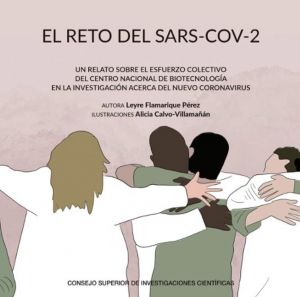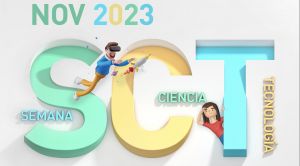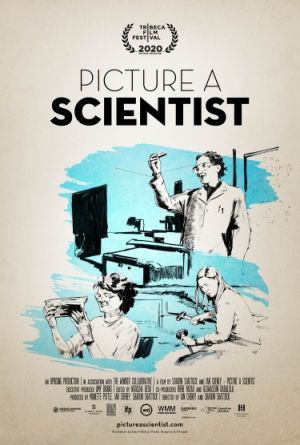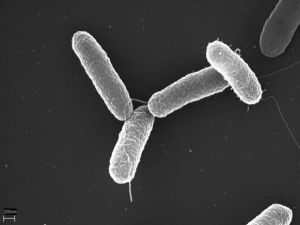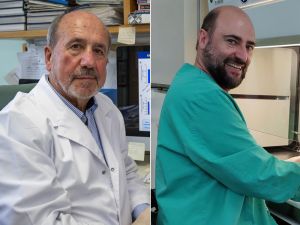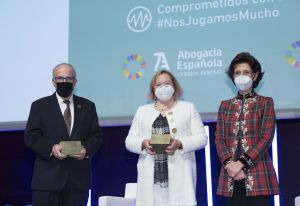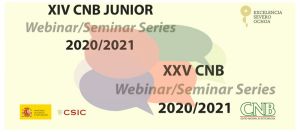- La publicación coincide con el cuarto aniversario de la declaración de la pandemia por la OMS.
- Se trata de un diario de a bordo de la investigación realizada en el centro tras la aparición del SARS-CoV-2.
Han pasado cuatro años desde que la Organización Mundial de la Salud (OMS) elevara la emergencia causada por el patógeno más famoso de este siglo, el SARS-CoV-2, al nivel de pandemia por los datos alarmantes referidos a su propagación y gravedad. El nuevo virus revolucionó cualquier ámbito de la sociedad sin excepción. Para la ciencia, supuso todo un desafío a la par que una oportunidad difícil de comparar con cualquier otro evento acontecido.
El Consejo Superior de Investigaciones Científicas (CSIC), a través de su editorial, recoge la experiencia de uno de sus centros, el Centro Nacional de Biotecnología (CNB-CSIC), durante los dos años posteriores a esta declaración. Se trata del libro El reto del SARS-CoV-2. Un relato sobre el esfuerzo colectivo del Centro Nacional de Biotecnología en la investigación acerca del nuevo coronavirus, escrito por la periodista y comunicadora Leyre Flamarique e ilustrado por la investigadora del CNB-CSIC Alicia Calvo-Villamañán.
Mario Mellado, director del CNB-CSIC remarca el objetivo del libro: “Hemos querido recoger de manera clara no solo los resultados científicos del trabajo realizado en la pandemia, sino la parte más humana de la investigación, ya que todo nuestro personal se volcó en colaborar y aportar su granito de arena en la búsqueda de soluciones desde los distintos ámbitos de conocimiento del centro”.
Propuesta de actividades de la Semana de la Ciencia y la Innovación 2023

Como cada año, la Semana de al Ciencia llega en noviembre al CNB. Entre las actividades propuestas hay visitas a nuestras instalaciones, charlas o talleres.
Es necesario realizar la inscripción a través de los formularios web correspondientes. El plazo de inscripción de abre el 23 de octubre a las 9:00.
Descripción de las actividades
ACTIVIDAD: Visitas a las instalaciones de investigación del CNB (2 FECHAS)
Jornadas de puertas abiertas
Dirigido a Estudiantes ESO, Bachillerato, Ciclos formativos, Público general, Público universitario
Fechas actividad
07 de Noviembre 2023, de 10:00 a 13:00. Es necesaria la reserva de plaza a través de este formulario de inscripción a partir del día 23 de octubre
14 de noviembre 2023, de 10:00-13:00. Es necesaria la reserva de plaza a través de este formulario de inscripción a partir del día 23 de octubre
Aforo: 30
ACTIVIDAD: El Club de los Científicos Olvidados: 13
El CNB en colaboración con Ludo Ergo Sum presenta una nueva aventura del Club de los Científicos Olvidados: Trece. El Club se enfrenta a un nuevo reto: Grandes pesadillas afectan a sus integrantes y nuevas paradojas temporales trastocan dramáticos hechos históricos. ¿Ha recaído sobre ellos una maldición o hay una explicación racional a estos hechos? Nuestros participantes tendrán que utilizar el método científico para ayudar al Club a resolver un enigma repleto de pesadillas, paradojas temporales y misterios.
Dirigido a público general, mayores de 15 años
FECHA: 16 de Noviembre 2022, de 16:30 a 20:00
Aforo: 10 grupos entre 2 y 5 participantes (máximo 50 personas)
Es necesaria la reserva de plaza a través del formulario de inscripción a partir del día 23 de octubre
Organizadora: Raquel Tenorio
Colaborador
Asociación de juegos Ludo Ergo Sum
Actividad: ¡Aprende divirtiéndote!!! Charla y juego formativo sobre la transferencia del conocimiento científico y tecnológico a la sociedad
Charla + taller. Se pondrá un ejemplo científico sobre un descubrimiento y se explicará la importancia de llevar a cabo un estudio para valorizar los resultados obtenidos, cómo proteger la propiedad intelectual e industrial, cómo se transfiere a la sociedad y cómo se gestiona y negocia su licencia. Estos conceptos se consolidarán en un juego donde los participantes contaran con el apoyo de una pequeña ficha resumen y asumirán diferentes papeles (empresarios, clientes, personal de una Oficina de Transferencia de Conocimiento del CSIC, etc.). Los grupos deberán superar diferentes pruebas y tendrán que negociar según sus roles para conseguir las mejores condiciones según sus intereses y objetivos
Fecha: 17 de noviembre, 17:00-19:30
Aforo: 12 participantes, mayores de 15 años.
Es necesaria la reserva de plaza a través de este formulario de inscripción a partir del día 23 de octubre
Ponentes: Cristina Merino Fernández, Marta García del Barrio
Colaborador
El viernes #25N se conmemora el Día Internacional para la Eliminación de la Violencia contra las Mujeres.
El próximo martes 22 de noviembre realizaremos un pase del documental Picture a Scientist (ver trailer) a las 12.00 h en el salón de actos del CNB.
Este largometraje aborda las dificultades que encuentran las mujeres científicas a lo largo de su carrera y relata distintos casos de discriminación y acoso en el entorno de la investigación. Es muy interesante para darnos cuenta de que estas situaciones también ocurren en nuestro ámbito y os animamos a asistir.
- El director del Centro Nacional de Biotecnología (CNB-CSIC) pilota un centro que busca vacunas, antivirales y anticuerpos para la covid-19, sin olvidar la investigación del cáncer, los antibióticos y la contaminación
El inmunólogo Mario Mellado, director del Centro Nacional de Biotecnología (CNB-CSIC), lleva en el cargo casi tanto tiempo como el SARS-CoV-2 con nosotros. Él se considera “un tipo positivo” y confía en que podamos acabar con la situación actual. Mellado pone su propio grano de arena al frente de un centro que se ha convertido en referente en la investigación por y para la pandemia. Mientras, continúa con sus propios proyectos científicos centrados en el sistema inmune.
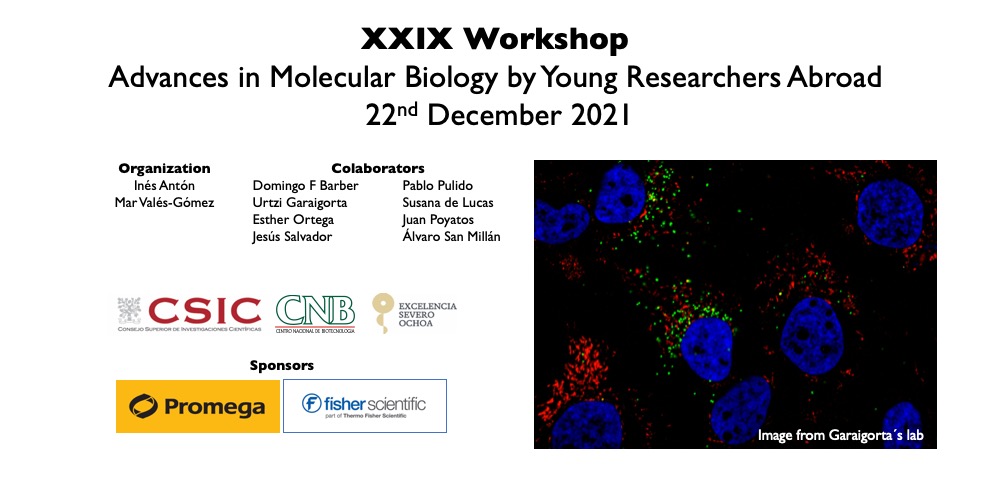
The Centro Nacional de Biotecnología (CNB-CSIC) will host the 29th edition of the traditional conference “Advances in Molecular Biology by Young Researchers Abroad” next 22nd of December 2021.
The CNB invites all postdoctoral scientists working abroad to join us on the 22nd of December to present their work at the now traditional conference series “Advances in Molecular Biology by Young Researchers Abroad”, organised just before the Christmas break.
For the last 29 years, this event has been a point of contact for scientists interested in sharing their research with the Spanish scientific community. Besides the exchange of the latest scientific advances, the conference is a unique showcase of the best young talent in the research community abroad.
In addition, a networking session to promote the interaction between CNB researchers and the speakers will be held. The intention of these short meetings is to establish a one-to-one first contact with CNB researchers.
We look forward to seeing all of you, to make the workshop as successful as in previous years. Please distribute this announcement to your contacts.
More information here
- Un grupo de investigación con participación del Instituto de Biomedicina de Valencia (IBV) y del Centro Nacional de Biotecnología de Madrid (CNB), ambos del CSIC, realiza la mejor caracterización del sistema que permite a la bacteria Salmonella sobrevivir en el cuerpo humano
- El hallazgo abre la puerta a diseñar nuevos fármacos antimicrobianos
Un grupo de investigación donde participan científicos del Instituto de Biomedicina de Valencia (IBV) y del Centro Nacional de Biotecnología (CNB), ambos del Consejo Superior de Investigaciones Científicas (CSIC), junto a la Universitat de València (Instituto Universitario Biotecmed) y la Universidad Autónoma de Madrid, han aclarado el mecanismo que emplea la bacteria patógena Salmonella para controlar la expresión de cientos de sus genes, entre ellos los que controlan la adaptación a nuestro organismo y, por tanto, su capacidad para infectarnos. El hallazgo, publicado en la revista Nucleic Acids Research, abre la puerta a diseñar nuevos fármacos antimicrobianos.
El trabajo describe con precisión el mecanismo de funcionamiento de la proteína RcsB de Salmonella para controlar la expresión de un número elevado de genes. RcsB es una proteína que se une al ADN para controlar la expresión de genes cuyos productos son necesarios para reorganizar la arquitectura de la envuelta celular en respuesta a daños externos. Esta proteína recibe señales de otras proteínas dispuestas en la envuelta y que actúan de antenas, formando todas ellas el denominado ‘sistema Rcs’, conservado en la familia de las enterobacterias (Enterobacteriaceae). Esta familia está formada por más de 100 géneros bacterianos que incluyen especies y serovares como Salmonella enterica serovar Typhi (S. typhi) o Shigella dysenteriae, causantes de la fiebre tifoidea y la disentería en humanos.
- El proyecto de Mariano Esteban y Juan García Arriaza, del CNB-CSIC, que utiliza una variante del virus que sirvió para erradicar la viruela, se publica en ‘Journal of Virology’
- La producción de la vacuna se está desarrollando en colaboración con la biotecnológica española Biofabri, del grupo Zendal, para comenzar los ensayos clínicos
El candidato vacunal MVA-CoV-2-S, que usa como vehículo el virus vaccinia modificado de Ankara (MVA) para transportar una proteína del SARS-CoV-2 (la proteína S) que estimule la defensa inmunitaria contra el coronavirus, ha probado su eficacia en modelos animales, y está por tanto listo para seguir avanzando hacia las pruebas clínicas, según se publica en la prestigiosa revista Journal of Virology.
El proyecto de vacuna para el SARS-CoV-2 que dirigen los virólogos Mariano Esteban y Juan García Arriaza es el más adelantado de las tres vacunas contra la covid-19 que se están desarrollando en el Consejo Superior de Investigaciones Científicas (CSIC).
Ayer se celebró en Madrid el acto de entrega del XII Premio Derechos Humanos de la Abogacía en el Museo Reina Sofía que este año el Consejo General de la Abogacía Española a través de la Fundación Abogacía ha otorgado al Consejo Superior de Investigaciones Científicas (CSIC) y su Centro Nacional de Biotecnología (CNB-CSIC).
El director del CNB agradeció el reconocimiento a nuesta institucion recordando que “los investigadores trabajamos por y para responder a los problemas de la ciudadanía y para aportar calidad de vida y bienestar a la sociedad en la que vivimos” y que especialmente durante este año “hemos puesto de manifiesto que actuando coordinadamente y aunando esfuerzos somos capaces de dar respuestas eficaces a la sociedad”. “El desafío al que nos enfrentamos es enorme pero puedo asegurarles que la ilusión y el trabajo que los científicos realizamos también lo son y que podremos superar la adversidad con éxito”.
The new seminar season at the CNB will start next Friday October 9th
The XIV Junior Seminar, organised by PhD students, will open the season with a talk by Rosa Lozano-Duran, from the Shangai Center for Plant Stress Biology (October 9th).
The XXV Cycle Seminar will commence next 23rd of October, with a talk by Ron Milo, from the Weizman Institute of Science in Israel
This year, our seminars will be online until further notice, please check our website for registration (only required for external attendees)
The Women for Africa Foundation (FMxA), in line with its mission of contributing to the development of Africa through the drive of its women, is launching the 6th Edition of SCIENCE BY WOMEN programme, with the aim to promote African women’s leadership in scientific research and technology transfer and to foster the capacity of the research centres in their home countries. The main goal is to enable African women researchers and scientists to tackle the great challenges faced by Africa through research in health and biomedicine, sustainable agriculture and food security, water, energy and climate change.
The programme´s ultimate goal is to enable African women researchers to play a leading role in the transition of Africa to a knowledge-based and innovation-led economy through research that can be transferred into products, processes, services and technologies having impact on people´s lives. To achieve this ambitious goal, FMxA collaborates with 19 Spanish Centres of Excellence, whose prestige is unanimously recognized throughout Spain and internationally, thereby ensuring excellence in scientific research in various fields.
Each of these centres will host 1 senior woman researcher with at least 3 years of post-doctoral experience for a six-month fellowship. Applications will be subjected to a rigorous selection process, evaluating the academic merits and leadership of the applicants as well as the scientific quality and expected impact of their research projects. Selected candidates will receive training and integration in a dynamic, multidisciplinary and highly competitive working team, where they will be able to develop their research projects and acquire complementary skills, empowering them to transfer their research results into tangible economic and social benefits.
Deadline for applications is September 30, 2020. EXTENDED UNTIL THE 20th OF OCTOBER
Only applications submitted in English via the Science by Women website will be accepted
COOKIES POLICY
A cookie is a text file that is stored on your computer or mobile device via a web server and only that server will be able to retrieve or read the contents of the cookie and allow the Web site remember browser preferences and navigate efficiently. Cookies make the interaction between the user and the website faster and easier.
General information
This Website uses cookies. Cookies are small text files generated by the web pages you visit, which contain the session data that can be useful later in the website. In this way this Web remembers information about your visit, which can facilitate your next visit and make the website more useful.
How do cookies?
Cookies can only store text, usually always anonymous and encrypted. No personal information is ever stored in a cookie, or can be associated with identified or identifiable person.
The data allow this website to keep your information between the pages, and also to discuss how to interact with the website. Cookies are safe because they can only store information that is put there by the browser, which is information the user entered in the browser or included in the page request. You can not run the code and can not be used to access your computer. If a website encrypts cookie data, only the website can read the information.
What types of cookies used?
The cookies used by this website can be distinguished by the following criteria:
1. Types of cookies as the entity that manages:
Depending on who the entity operating the computer or domain where cookies are sent and treat the data obtained, we can distinguish:
- Own cookies: are those that are sent to the user's terminal equipment from a computer or domain managed by the editor itself and from which provides the service requested by the user.
- Third party cookies: these are those that are sent to the user's terminal equipment from a machine or domain that is not managed by the publisher, but by another entity data is obtained through cookies.
In the event that the cookies are installed from a computer or domain managed by the editor itself but the information collected by these is managed by a third party can not be considered as party cookies.
2. Types of cookies as the length of time that remain active:
Depending on the length of time that remain active in the terminal equipment can be distinguished:
- Session cookies: cookies are a type designed to collect and store data while the user accesses a web page. Are usually used to store information that only worth preserving for the service requested by the user at any one time (eg a list of products purchased).
- Persistent cookies: cookies are a type of data which are stored in the terminal and can be accessed and treated for a period defined by the head of the cookie, and can range from a few minutes to several years.
3. Cookies types according to their purpose:
Depending on the purpose for which the data are processed through cookies, we can distinguish between:
- Technical cookies: these are those that allow the user to navigate through a web page or application platform and the use of different options or services it exist as, for example, control traffic and data communication, identify the session, access to restricted access parts, remember the elements of an order, make the buying process an order, make an application for registration or participation in an event, use security features while browsing store content for dissemination videos or sound or share content via social networks.
- Customization cookies: these are those that allow the user to access the service with some general characteristics based on a predefined set of criteria in the user terminal would eg language, the type of browser through which you access the service, the locale from which you access the service, etc.
- Analysis cookies: they are those that allow the responsible for them, monitoring and analyzing the behavior of users of the web sites that are linked. The information gathered through such cookies are used in measuring the activity of web sites, application or platform and for the profiling of user navigation of such sites, applications and platforms, in order to make improvements function data analysis how users use the service.
Management tool cookies
This Website uses Google Analytics.
Google Analytics is a free tool from Google that primarily allows website owners know how users interact with your website. Also, enable cookies in the domain of the site in which you are and uses a set of cookies called "__utma" and "__utmz" to collect information anonymously and reporting of website trends without identifying individual users..
For statistics of use of this website use cookies in order to know the level of recurrence of our visitors and more interesting content. This way we can concentrate our efforts on improving the most visited areas and make the user more easily find what they are looking for. On this site you can use the information from your visit for statistical evaluations and calculations anonymous data and to ensure the continuity of service or to make improvements to their websites. For more details, see the link below privacy policy [http://www.google.com/intl/en/policies/privacy/]
How to manage cookies on your computer: disabling and deleting cookies
All Internet browsers allow you to limit the behavior of a cookie or disable cookies within settings or browser settings. The steps for doing so are different for each browser, you can find instructions in the help menu of your browser.
If you decline the use of cookies, since it is possible thanks to the preferences menu of your browser or settings, reject, this website will continue to function properly without the use of the same.
Can you allow, block or delete cookies installed on your computer by setting your browser options installed on your computer:
- For more information about Internet Explorer click here.
- For more information on Chrome click here.
- For more information about Safari click here.
- For more information about Firefox click here.
Through your browser, you can also view the cookies that are on your computer, and delete them as you see fit. Cookies are text files, you can open and read the contents. The data within them is almost always encrypted with a numeric key corresponding to an Internet session so often has no meaning beyond the website who wrote it.
Informed consent
The use of this website on the other hand, implies that you paid your specific consent to the use of cookies, on the terms and conditions provided in this Cookies Policy, without prejudice to the measures of deactivation and removal of cookies that you can take, and mentioned in the previous section.

